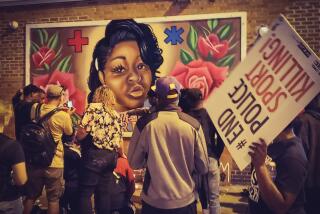Rooting Out Another National Shame : Black-on-black crime crisis is pointed up by the assault on civil rights figure Rosa Parks
- Share via
The criminal attack on Rosa Parks, the 81-year-old widow who is considered the mother of the modern civil rights movement, calls attention to the epidemic of black-on-black crime. The rising tide of violence must be addressed not just by police but by responsible African Americans fighting crime as courageously as Parks fought legal segregation.
“Many gains have been made, but as you can see at this time, we still have a long way to go,” Parks said after she was beaten and robbed in the bedroom of her Detroit home. “So many of our young people are going astray.” The crime statistics prove her point. Black Americans are much more likely to become victims of violent crime than other Americans. In most cases, their attackers are also black. That appears to be the case in the Parks assault.
As the Rev. Jesse Jackson points out, Parks was not assaulted by the Ku Klux Klan or racist skinheads. She says she was struck by a young black man. Thus the attacker would be one of those for whom civil rights protesters sacrificed so much.
Parks’ courage in 1955 in refusing to obey an order to move to the back of a bus so a white man could have her seat prompted the famous Montgomery, Ala., bus boycott. The protest was led by a young minister who renounced violence, Martin Luther King Jr. The protesters prevailed, but not without great personal cost. Parks could no longer find work in Alabama and moved to Detroit, then considered part of the job-rich Northern “Promised Land.” No one foresaw that Detroit, like other major cities, would lose much of that promise.
After Parks was attacked this week, police circulated a composite drawing of the assailant. Armed with that sketch, her neighbors captured a suspect and held him for police. These people refused to be intimidated. Such a sense of neighborly help must become contagious. Police need help from people who are willing to come forward and work hard to make the streets safe again. In 1955, Rosa Parks challenged America to fight discrimination. In 1994, Rosa Parks challenges America to fight another national shame--rampant crime.
More to Read
Sign up for Essential California
The most important California stories and recommendations in your inbox every morning.
You may occasionally receive promotional content from the Los Angeles Times.










